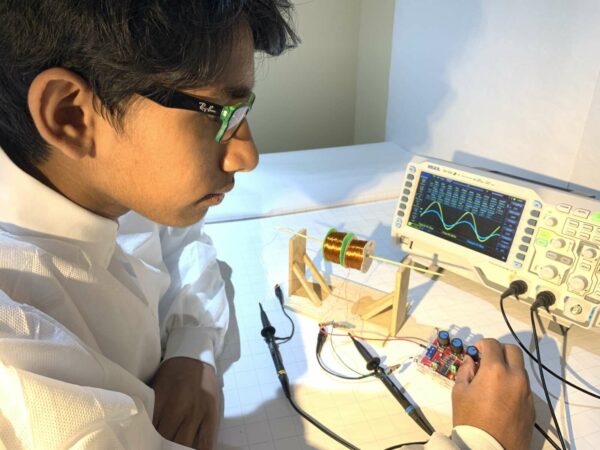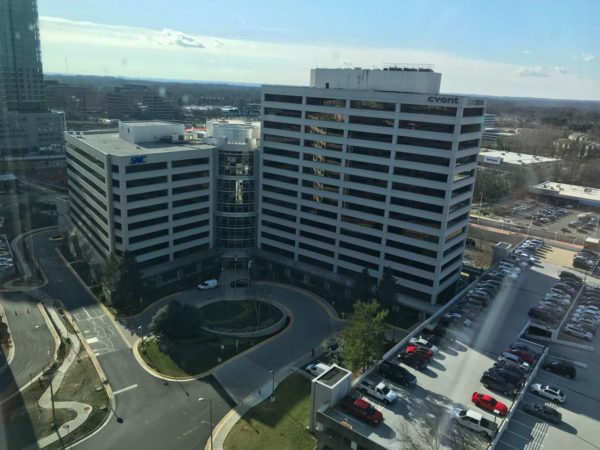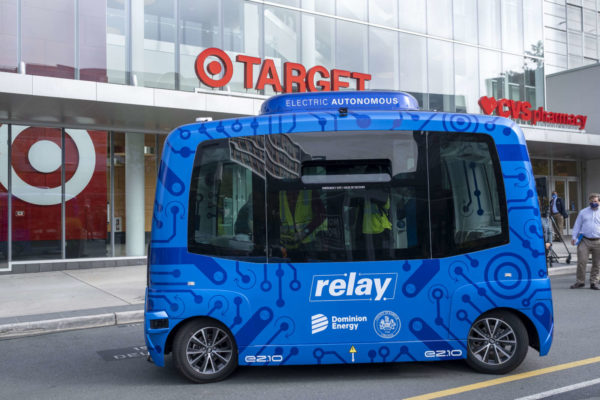
The Fairfax County Economic Development Authority gave nearly $29,000 to 10 social media influencers over the past year to highlight its jobs portal and virtual career fairs.
The campaign primarily involved Instagram users posting about events with hashtags and links to drive traffic. Economic development officials said the effort was intended to develop its brand as well as the region’s job market and engage target audiences, specifically with millennials in mind.
“We felt like we needed to do some experimentation,” FCEDA President and CEO Victor Hoskins said.
The campaign drew 536 clicks to the authority’s Work in Northern Virginia jobs board and generated 276 views in online registration page traffic for technology and entry-level career fairs.
While Instagram advertising can average around $1.25 per click, the FCEDA said influencer marketing helps reach a highly targeted audience through sources that users trust. The campaign required the influencers to note that their social media posts were sponsored content.
The social media influencer contracts cost a total of $28,800 with individual agreements ranging from $800 to $7,000 and mainly required users to make Instagram posts and stories, according to agreements obtained by Tysons Reporter. One agreement included an Instagram video, and some included blog post requirements.
The authority says third-party consultant New York City-based Development Counsellors International and each influencer negotiated rates.
“[What we’re] really ultimately trying to do is build awareness of northern Virginia as this location that has thousands and thousands of jobs, and it’s a great place to live,” said Alan Fogg, the authority’s vice president of communications.
Economic development officials say the campaign delivered $205,000 in earned media value, reached more than 332,000 Instagram users, and generated nearly 25,000 likes, comments, and shares.
The FCEDA is not unique in using social media personalities to reach potential audiences. Other governmental bodies have turned to social media influencers for tourism marketing as well as running COVID-19 messaging.
Fairfax County funds the economic development authority with around $9 million each year currently, and social media advertising is just one way economic development leaders are trying to market the region to help improve the jobs pipeline.
“The message we deliver to all the recruiters and chief human resources officers from all the companies here in Fairfax County is: You sell your organization, your company, and why [to] come work there, and we’re going to help complement you with selling the region,” Mike Batt, the director of the authority’s talent initiative program, said.
The FCEDA used Development Counsellors International to identify and vet the influencers, set goals for the number of posts, and ensure posting requirements were met, Fogg said in a statement. FCEDA staff selected the influencers presented to them.
Batt said Development Counsellors International received a competitively awarded contract from the EDA. The consultant also developed the jobs hub, which the authority recently lauded.
The Fairfax County Economic Development Authority spearheaded the jobs posting site, but it’s connected to nine other economic development groups and localities in Northern Virginia.
“Economic development is not the business it was five years ago,” Hoskins said. “It really takes a lot of innovation.”
Photo via Solen Feyissa/Unsplash
Political Anxieties Drive Tensions at McLean Bible Church — “The leaders of McLean Bible, one of the D.C. region’s largest and most high-profile evangelical churches, are facing attempts from its own members to spread disinformation to take control of the church, Pastor David Platt warned the congregation in a sermon earlier this month…Platt said he believes the recent controversy has been a collision of several things, including racial tensions and political tensions.” [The Washington Post]
Vienna to Hold Meeting on Nutley Shared-Use Path — “Property owners were notified Monday about an upcoming meeting to discuss design of the Nutley Street shared-use path and Hunters Branch stream restoration projects. The Town of Vienna’s two projects are in design and focus on the area of Nutley Street south of Maple Avenue. A virtual meeting on both concepts will be held at 7 p.m. on Wednesday, Aug. 4.” [Patch]
Fairhill Elementary Announces New Principal — “Grateful to have been on hand this afternoon when Mr. Cooper was announced as the new principal of @FairhillES. Looking forward to seeing him put his proven track record of success to work at this amazing Blue Ribbon School! #GoTigers” [Karl Frisch/Twitter]
Meet Internet Inventors Vinton Gray Cerf and Robert E. Kahn — “The indisputable inventors of one of the greatest planet-changing instruments of all time live a few minutes apart in McLean and have lived in Northern Virginia for four decades…The impact of the internet on life as we know it is profound and ongoing, but did you know until right now whom to credit — or blame?” [Northern Virginia Magazine]
Northrop Grumman Hires Sustainability Chief — Northrop Grumman Corp. has hired Michael Witt as its vice president and chief sustainability officer, effective Aug. 9. Witt was most recently working at Dow, serving in several executive positions. Northrop Grumman didn’t immediately respond to an inquiry seeking comment. [Northrop Grumman]
Tysons-headquartered Cvent, which provides business tools for customers to plan, market, and organize meetings and events, is headed back to the stock market.
The event-management tech company announced today (Friday) that it will merge with a blank check company for investors in a deal that’s set to close in the fourth quarter of 2021.
“We are thrilled to go public again because it provides significant financial resources to further strengthen our business and accelerate investments across our platform and related services,” CEO and founder Reggie Aggarwal said in a letter posted on Cvent’s website.
Unlike its initial public offering on the New York State Exchange in 2013, Cvent will make use of the less rigorous and in-vogue process of a special-purpose acquisition company (SPAC) called Dragoneer Growth Opportunities Corp. II, affiliated with a San Francisco-based investment firm.
The deal values Cvent at $5.3 billion and could give the company over $800 million in cash, which can be used to reduce debt.
Cvent’s plans to go public were first reported on Wednesday (July 21) by the Wall Street Journal, though a spokesperson then described the news as “WSJ speculation” when asked for comment by Tysons Reporter.
After Cvent initially went public, Vista Equity Partner, an investment firm based in Austin, Texas, acquired it for $1.65 billion in 2016.
The decision comes after a difficult year for Cvent and the event management industry as a whole.
Schools, governments, and businesses largely moved to virtual environments when COVID-19 swept the U.S. in March 2020. At the time, Cvent didn’t have a virtual event platform, but it developed one in five months as it assisted customers in managing tens of thousands of virtual events.
“The meetings and events industry has experienced rapid digital transformation over the last 18 months, with the pandemic creating a new paradigm for the events industry,” Aggarwal said in a statement. “Events became digitized through virtual and online experiences, and we invested heavily in expanding our virtual event capabilities.”
Dragoneer founder and managing partner Marc Stad said in a statement that with much of the U.S. reopening, they expect to move into a “hybrid world that combines elements of in-person and virtual events.”
Aggarwal founded Cvent in 1999 after organizing dozens of events each year with a nonprofit he started while working fulltime as a corporate lawyer. He found difficulties with only having Microsoft Outlook for email, Excel, and yellow sticky notes as tools, so he created the company to ease the event process with technology.
The company has its headquarters in Boro Station at 1765 Greensboro Station Place.
According to a presentation, Cvent currently has roughly 23,000 customers and is forecasting over half a billion dollars in revenue for 2021.
“Now, we are engaging in a hybrid world, as in-person events resume, and virtual events remain prominent,” Aggarwal said. “With the increased digitization of our industry, events are ‘always on’ and have fewer boundaries.”
The tech company has around 4,000 employees across U.S. locations and around the globe. It also provides hotels with software and marketing services for making the most of their meetings and events business.
The Cvent and Dragoneer boards of directors have both approved the proposed business combination, but it’s subject to approval by Dragoneer’s shareholders too, among other factors.
Cvent said that upon closing of the deal, the combined company will operate as Cvent Holding Corp. and is expected to trade under its old ticker symbol “CVT.”

Some Fairfax County student athletes won’t be headed to courts or fields this winter, but instead, to computer labs, as the 10th largest school district in the country prepares to launch an esports program.
The Fairfax County Public Schools athletic director detailed the new initiative to Tysons Reporter, saying the new program will connect students in high schools through a popular, soccer-like game — in which players drive futuristic cars — called Rocket League.
“I think it’s going to be a great opportunity for our students,” said Bill Curran, director of the FCPS Office of Student Activities and Athletics, noting how students will have another way to fit in. “I think we’re going to have 25 highly competitive schools in the esports realm.”
While concerns about students’ screen time have persisted, even as the COVID-19 pandemic forced schools to adopt virtual learning, competitive online gaming has become increasingly popular, with both high schools and colleges getting in on the esports action.
The market research firm Newzoo reported in March that esports viewership increased from nearly 398 million people globally in 2019 to nearly 436 million in 2020 and could potentially reach 474 million this year.
The NCAA governing board voted in April 2019 against bringing esports under its purview, even as the association noted the rapid growth of esports on NCAA campuses.
“You’re going to see this ball roll faster and faster,” Curran said.
ESPN launched a new initiative to cover esports in 2016, though it shut the division down last year. In 2018, it became the first TV network to air a professional gaming contest in prime time for the cartoon-style multiplayer online battle game League of Legends.
YouTube and Twitch have also streamed content that’s worth billions of dollars and expected to grow annually, though that’s just a small slice of the video game industry.
The Virginia High School League, which governs sports, activities, and competitions in public schools throughout the Commonwealth, introduced esports as a pilot program in 2019 before approving it as an “emerging activity” for the 2020-2021 school year that could become sanctioned as an official VHSL activity.
Fairfax County Public Schools is currently looking for coaches to participate in its esports program, which has been in the works for more than two years and will operate under its Activities and Athletics office. Some teachers have already shown interest in helping, according to Curran.
Students will have to pay a $64 fee each season through a startup company PlayVS, which provides computer games and requires students to maintain eligibility through grades and attendance. FCPS is looking at ways to prevent the fee from becoming a barrier to participation.
With schools expected to open for in-person learning five days a week this fall, FCPS plans to have students participate in existing computer labs, rather than remotely. Like a traditional sports team, Curran says Fairfax County’s esports teams will likely have jerseys.
“Our kids, you know, they’re already playing the games,” Curran said. “They’re ready to go, and they’re eager for us to start this.”
Photo via Axville/Unsplash
(Updated at 8:15 p.m. on 7/23/2021) Fairfax County School Board Members at Nats Park During Shooting — Karl Frisch and Megan McLaughlin, who respectively represent the Providence and Braddock districts on the school board, were at Nationals Park on Saturday (July 17) when gunfire outside the stadium sent fans running for cover and suspended the game. Three people were injured in the shooting, including a woman who was attending the game, according to police. [Karl Frisch/Twitter, Megan McLaughlin/Twitter]
Virginia Announces Universal Broadband Plan — Gov. Ralph Northam announced a plan on Friday (July 16) to invest $700 million to make broadband services universally accessible throughout the state. The funds will come from the state’s $4.3 billion federal COVID-19 relief allocation from the American Rescue Plan Act. [The Washington Post]
Mosaic District Art Gallery Presents New Show — The Torpedo Factory Artists Association will present the results of its regional painting competition at The Gallery @ Mosaic (links corrected) from July 23 through August 22. With more than 30 paintings from nearly 400 submissions, the show will the association’s first regional painting showcase and give the pop-up gallery its first in-person reception since it recently reopened after closing for the COVID-19 pandemic. [Northern Virginia Magazine]
McLean Little League Softball Teams Celebrate Strong Seasons — “It has been the case for many years now, so it was no surprise that McLean Little League all-star girls softball teams again had strong showings in recent state tournaments, with one squad winning the championship and two others finishing second.” [Sun Gazette/Inside NoVA]

(Updated at 4:55 p.m.) Two technology companies in Tysons have each received $100,000 grants as part of a new state initiative intended to support projects that turn research into commercial products or services.
Gov. Ralph Northam announced yesterday (Monday) that Virginia will award $3.4 million in grants to 34 small, technology-focused businesses for the inaugural round of the Commonwealth Commercialization Fund (CCF), which launched in 2020 to help advance promising technology through the development process.
The Tysons-based recipients are the cybersecurity company Onclave Networks Inc. and Jeeva Informatics Solutions Inc., which is developing a cloud platform to help medical researchers recruit and work with patients for clinical trials.
“Facilitating research breakthroughs and getting new technologies out of the lab and into the hands of consumers is key to driving economic growth and creating jobs in the Commonwealth,” Northam said in the news release. “I am confident this first round of CCF awards will produce far-reaching benefits and congratulate these innovators and entrepreneurs on their success in developing transformative solutions to improve lives and address some of the most pressing challenges we face.”
The CCF consolidated Virginia’s existing Commonwealth Research Commercialization Fund and Virginia Research Investment Fund. Each of the Fiscal Year 2021 recipients received $100,000 and will provide matching funds.
According to the news release from the governor’s office, the fund focuses on technology “with a high potential for economic development and job creation” and that “position the Commonwealth as a national leader in science- and technology-based research, development, and commercialization.”
Onclave received a grant for its Zero Trust network, which aims to allow for remote communications and operations of “smart” infrastructure, such as telemedicine services or autonomous transportation, while providing protection from security threats.
The company previously received funding from the 2020 Commonwealth Research Commercialization Fund and was selected to participate in the Smart City Works accelerator program as a winner of Fairfax County’s first Smart City Challenge in March.
Onclave is also working with the Center for Innovative Technology to deploy its technology at the Virginia Smart Community Testbed in Stafford County.
“We have repeatedly seen how important it is to secure not just our devices and networks, but the data as well,” CIT Chief Technology Officer David Ihrie said in a statement. “As the Internet of Things continues to rapidly expand, cybersecurity solutions like Onclave’s Zero Trust platform are essential foundational elements of our new digital infrastructure.”
Other Fairfax County recipients of CCF funding include AtWork Systems and Rimstorm Inc. in Herndon as well as Service Robotics & Technologies in Springfield and Keshif in Alexandria.
“The Fairfax County Economic Development Authority applauds the granting of the inaugural round of the Commonwealth Commercialization Fund awards, including to the 6 Fairfax County-area-based companies,” Fairfax County Economic Development President and CEO Victor Hoskins said by email. “The CCF awards will provide funding support to spur research commercialization, with the intent of technological development leading to economic growth in Virginia.”
Photo via Alesia Kazantceva/Unsplash

A 13-year-old Great Falls resident’s science experiment about recharging electric vehicles while they’re in motion won him statewide honors.
Kriesh Tivare earned the State Merit Award for Virginia in the national “3M Young Scientist Challenge” last month for an experiment that examined how to make contactless charging a reality using coils in a roadway to power a toy car.
“It basically charges the car as it drives over,” Kriesh said.
A partnership between the engineering company 3M and Discovery Education, the Young Scientist Challenge takes place annually and is open to students in fifth through eighth grade. Competitors submit short videos explaining the science behind a possible solution to a problem they see in their community.
A panel of judges selected a merit winner from each state as well as 10 finalists, who will compete in a final event at 3M’s headquarters in Saint Paul, Minnesota, in October. The overall winner will receive $25,000 and the opportunity to get a mentorship from the company.
In his prize-winning experiment, Kriesh explains how switches on a road could be pressed by a tire to close a circuit and use electromagnetic induction to power a vehicle, rather than having stationary charging stations restoring power.
Kriesh got the idea when his family would go on trips and have to hunt for and spend time at charging stations for their Tesla Model 3, which they normally charge every day. During one family trip in 2019 to Boston, range anxiety was evident as they had to break every five to six hours, taking 45 minutes to an hour to recharge.
“At the mall, there’s this one spot that’s dedicated to…charging, and a lot of the charging stations are already being utilized,” he said, contrasting the amount of charging stations to gas stations.
Kriesh created his own materials using a fishing rod to wrap coils hundreds of times around small PVC piping.
He used a frequency generator to power coils on a roadway model and an oscilloscope to measure how much power was induced, experimenting with different coils and frequencies to maximize efficiency.
Heading into eighth grade at Cooper Middle School in McLean, Kriesh enjoys history and math classes and could see himself as an astronomical engineer, discovering a planet or looking for life in space.
Contactless charging — the term Kriesh used for his contest entry — is becoming a reality. For example, the company ElectReon Wireless Ltd. has deployed its technology on public roadways in Israel and Sweden for buses and trucks.
Researchers in California examined the technology in the 1970s and 1980s and eventually tested electric vehicles in motion. A 1992 report investigating the feasibility of electrifying highways noted a roadway inductor would cost a “few million dollars per lane mile,” but equipment costs for vehicles were “considerably more uncertain” at that time.
A research team at Cornell University, led by electrical and computer engineering associate professor Khurram Afridi, has been working on improving road-powered charging technology for electric vehicles, which they say could have uses from electrifying highways to supporting autonomous forklifts and robots in manufacturing warehouses.
Afridi said in a video about the technology that the timing could be right to introduce changes to infrastructure in need of repair.
Kriesh is interested in continuing his experiment by looking at how 5G signals could allow road coils to charge a vehicle without pressure plates, avoiding the need for his model car to drive over switches.
“In the future, the 5G network will replace the switches within the road to activate the coils in the road instantaneously,” Kriesh said in his contest video. “Dynamic charging could be a promising future for smart, driverless vehicles.”

With federal money that gives low-income households a discount on internet service set to run out this year, Fairfax County leaders and staff are looking at ways to ensure people get access to broadband internet, which they’ve likened to a utility like electricity or water.
A staff report presented to the Fairfax County Board of Supervisors’ information technology committee on Tuesday (June 15) found that there are significant disparities in internet access among homes in the county due to infrastructure and affordability.
While different county representatives — from the school system to the Department of Family Services — were collaborating prior to the COVID-19 pandemic, they started looking more intently at equity issues during the pandemic, as technology needs hit a crescendo between students attending school from home and job seekers looking for work.
“Many of us saw at the outset how difficult it was for community members to work from home or for their children to be educated from home — whether or not they had the technology available, if they had strong enough internet connectivity, if they had space in their own homes to do this, or if they were trying to locate wireless within the community and do all of this from their own cars,” Fairfax County Public Library Director Jessica Hudson said.
Some zip codes are more affected by this lack of connectivity than others.
According to an analysis presented by the county, an estimated 4.2% of households in the county have no broadband internet access, but that number jumps up to 20.8% in the zip code 22044 and 18.8% in zip code 22041, both neighborhoods in the Seven Corners area of Falls Church.
The county estimates that 10.7% of households in north Reston (zip code 20190) are without broadband internet, along with 6.2% of Herndon residents (zip code 20170).
The gaps in connectivity are concentrated in areas with many people of color and lower-income households, Fairfax County Chief Equity Officer Karla Bruce said on Tuesday.
The Federal Communications Commission internet discount, known as the Emergency Broadband Benefit or EBB, helps lower-income households get a $50 discount each month for broadband service, among other benefits.
Officials are continuing to share information about the program, providing outreach in multiple languages and partnering with nonprofits and other community organizations.
You can still get the discount even if you have another benefit called Lifeline, which provides a $9.25 monthly discount indefinitely, Hudson said.
But the $3.2 billion fund set up to provide the EBB benefits nationwide is expected to run out this year, possibly around Thanksgiving, according to Hudson.
Among the county’s efforts to improve access, the library system offers Chromebooks that people can check out for two weeks at a time, along with extended exterior WiFi access outside buildings (except in parking garages) from 6 a.m. to 10 p.m.
In addition, Neighborhood and Community Services is conducting a countywide analysis of Wi-Fi access, and the Department of Housing and Community Development and Redevelopment and Housing Authority are conducting a site analysis to address connectivity barriers, according to the county presentation.
“All of these community agencies are trying their hardest to find ways to connect with residents and make sure that they have appropriate technology, digital literacy skills, and access points,” Hudson said.
County supervisors asked for more information to target areas in need as part of the county’s efforts to help overcome access issues.
Photo via Josefa nDiaz/Unsplash
Caffe Amouri Resumes Indoor Service — Vienna’s Caffe Amouri welcomed patrons back inside yesterday (Monday) for the first time in 16 months. The coffee shop will maintain some COVID-19 health rules, including a 30-minute seating limit and continued mask-wearing for staff with a request that customers keep using them as well. [Patch]
Capital One Hall Announces Opening Weekend Performer — The country band Little Big Town will perform two shows during the opening weekend of Capital One Hall in Tysons, the venue announced yesterday. Tickets for the shows on Oct. 2 and 3 will go on sale at 10 a.m. this Friday (June 18). [Capital One Hall/Twitter]
FCPS Hires Cybersecurity Director — Fairfax County Public Schools has a director of cybersecurity for the first time, with Vijai Rao, who previously worked for Metro, joining the school district on June 1. The position was created after a ransomware attack in September compromised personal information of students and staff. [Providence District School Board newsletter]
Tysons Company Holds Sports Equipment Drive — PenFed Credit Union, which is headquartered in Tysons, collected $3,000 worth of sports equipment with a drive led by employees and their families on June 9. The equipment will be distributed to at-risk youth in the D.C. region by local police, and the company also donated $15,000 to the Washington D.C. Police Foundation. [PenFed]
Nearly a year after an autonomous shuttle first traveled in the D.C. metro area, Fairfax County leaders are looking at ways to extend that kind of technology to the rest of the state.
The county’s Department of Economic Initiatives has partnered with the Fairfax County Economic Development Authority to host a series of virtual panels next Thursday (June 10) for an event titled “Creating an Autonomous Vehicle Ecosystem in Virginia.”
“This virtual event will address where we are today and what we need to do to make the dream of a network of fully autonomous vehicles a reality in the Commonwealth of Virginia,” the event page says.
The event will feature three panels on autonomous transportation in Virginia, including a case study of the electric, driverless Relay shuttle that Fairfax County and Dominion Energy are currently piloting in Merrifield.
Relay launched passenger service in October and travels between the Dunn Loring-Merrifield Metro station and the Barnes and Noble in the Mosaic District. The shuttle, which travels at 10 miles per hour, can transport up to 12 people but has been limited to three people and a public safety attendant for social distancing.
The Relay panel will feature Fairfax County Department of Economic Initiatives consultant Dale Castellow, Smart Community Innovation and Strategy Manager Eta Nahapetian, and Fairfax County transportation planner Sarah Husain.
There will also be panels with experts from the private and public sectors to talk about how technology can “safely enable vehicles to function in even the most complicated scenarios” and why it’s important to navigate the first mile and last mile of trips to successfully implement autonomous vehicle technology.
Other speakers include representatives from the Virginia Department of Transportation, the Virginia Department of Rail and Public Transportation, companies like Perrone Robotics and Sensagrate.
Mike Mollenhauer, director of the Virginia Tech Transportation Institute’s Center for Technology Implementation, will talk about the university’s partnership with VDOT to evaluate and test partially assisted autonomous vehicles in Fairfax County, including sections of I-66, I-495, Lee Highway, Arlington Boulevard, and areas where numerous crashes occur.
The free event runs from 1 p.m. to 2:15 p.m. Registration is free but should be done in advance to get information about how to attend.






